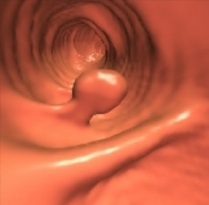por
Brendon Nafziger, DOTmed News Associate Editor | March 01, 2011
The proportion of surveyed U.S. hospitals offering virtual colonoscopy grew almost 31 percent in recent years, despite the absence of Medicare coverage or consensus from the medical community, according to a study published Tuesday in the Journal of the American College of Radiology.
The technique, also called computed tomographic colonography, involves taking CT scans of the colon and rectum and creating 3-D images to look for cancer and other abnormalities. Many radiologists believe the scans can increase screenings rates for at-risk patients who might be reluctant to undergo traditional colonoscopies, which require snaking a tube with a camera at the end through the colon.
According to the article, only 50 to 60 percent of U.S. adults over age 50 are screened according to guidelines. The Centers for Disease Control and Prevention recommends screening with a colonoscopy once every 10 years.



Ad Statistics
Times Displayed: 16169
Times Visited: 33 Final days to save an extra 10% on Imaging, Ultrasound, and Biomed parts web prices.* Unlimited use now through September 30 with code AANIV10 (*certain restrictions apply)
But CTC scans do not have universal support. The American Cancer Society, in 2008 guidelines, recommends them once every five years. But the same year, the U.S. Preventative Services Task Force said there was not enough evidence to endorse it.
Part of the problem is that if a polyp is detected during the CTC scan, a colonoscopy usually has to be ordered anyway to remove it. And the scans can pick up extracolonic findings, which might involve costly further testing or treatments, even though the detected abnormality might never pose a problem for the patient.
Citing lack of evidence, in 2009 the Centers for Medicare and Medicaid Services denied coverage for general screening, although it is covered by CMS and many private payers for specific indications, such as a follow-up to a failed colonoscopy, the researchers said.
Nonetheless, despite the controversy, usage of CTC scans appears to be on the rise.
"Although CTC is not yet widely accepted as a colorectal cancer screening tool for average-risk adults, anecdotally, it is clear that many hospitals in the United States have adopted the service," wrote the authors, led by Megan McHugh, with Northwestern University.
To check how many had actually adopted it, the researchers pored over hospital surveys conducted by the American Hospital Association from 2005 to 2008. They found a significant shift in the past few years. According to the report, 17 percent of general hospitals offered the screening in 2008, up from 13 percent three years earlier.
Unsurprisingly, the 669 hospitals offering CTC in 2008 were more likely to be large teaching hospitals, and those in high-income states, such as the Northeast. Between 3,895 and 4,021 hospitals were surveyed in the study years.

